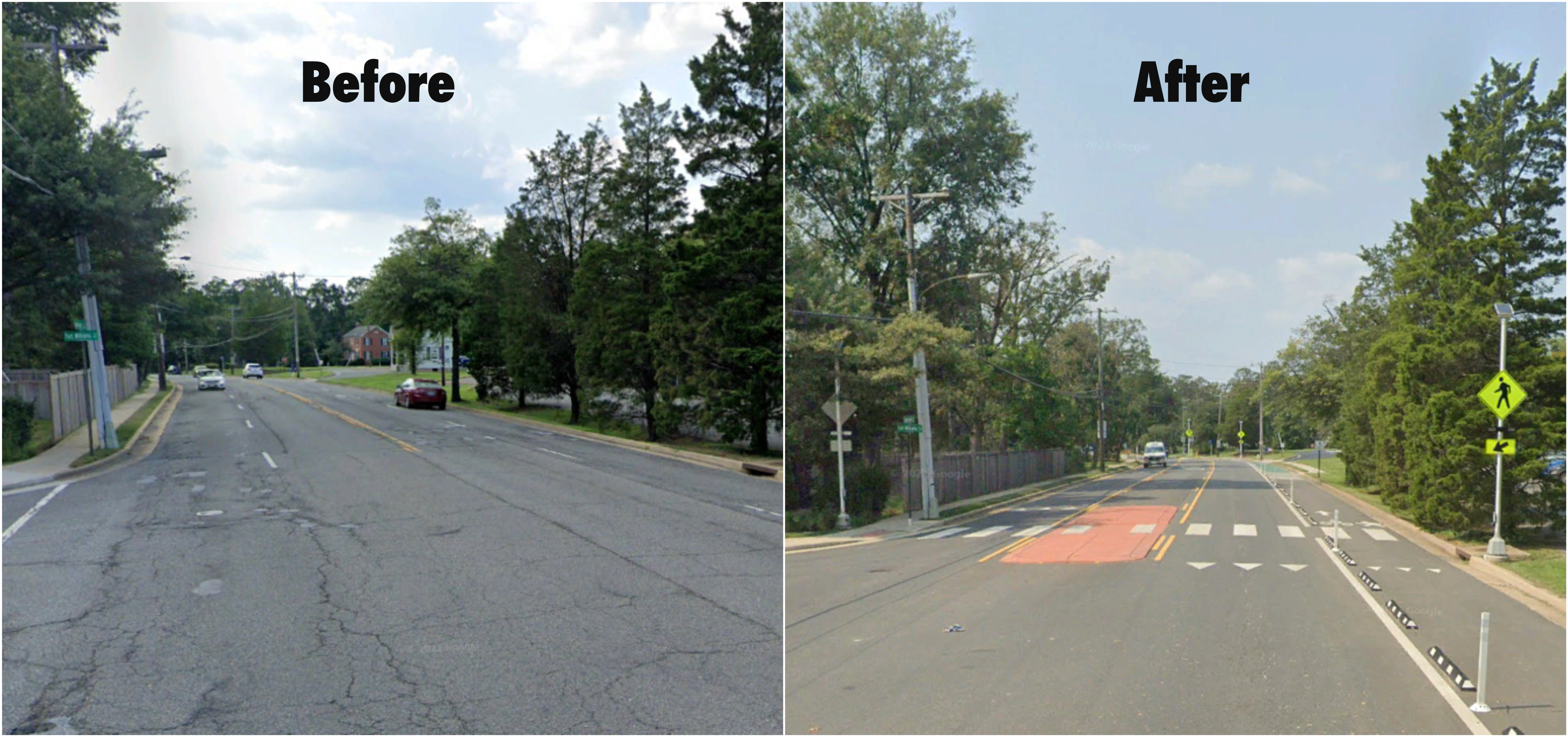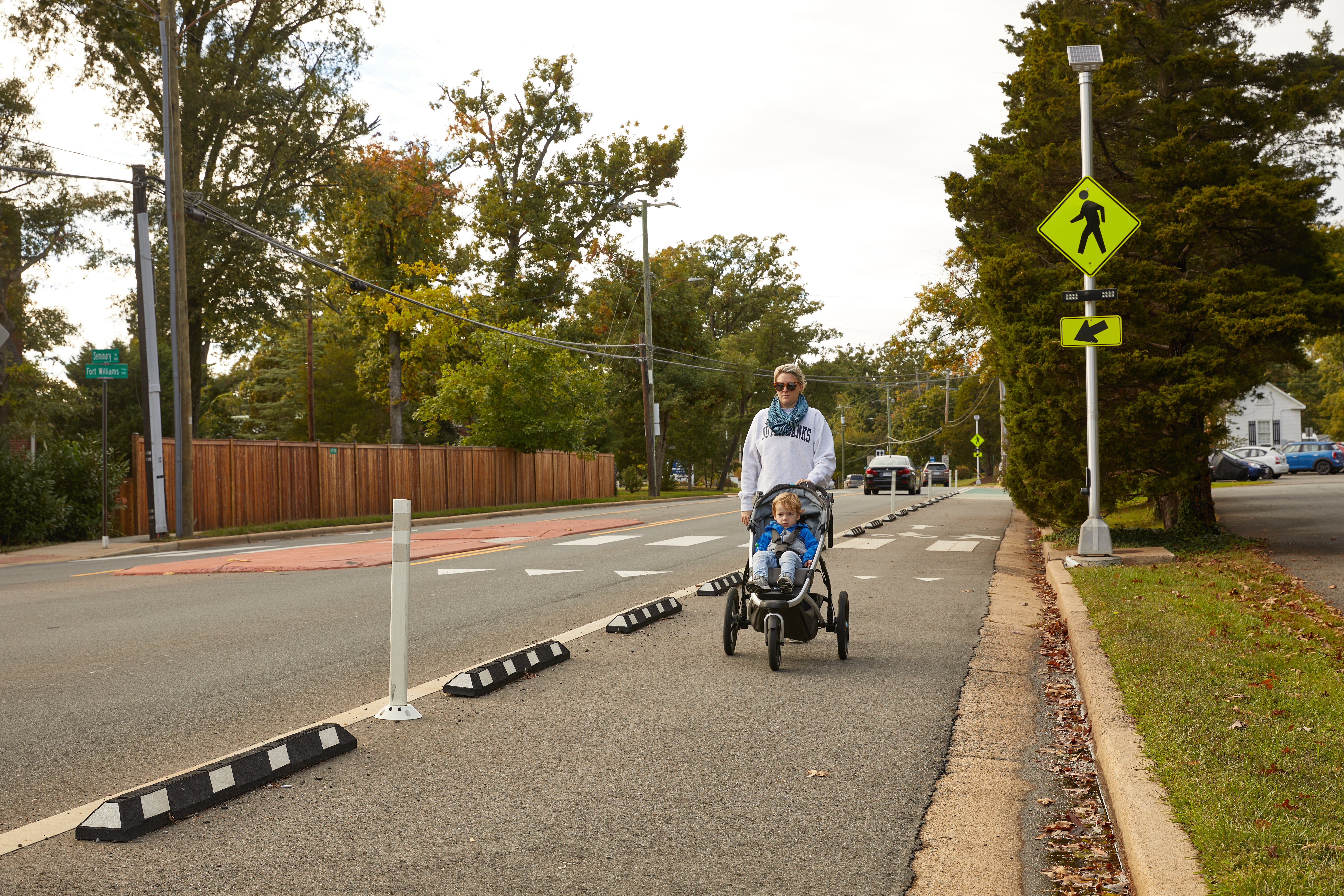
Seminary Road Complete Streets Project
Project Updates
- Project Evaluation: The Seminary Road Project Evaluation Report is now available. Key Findings include:
- Generally, traffic volumes, travel times and crashes went down.
- Speeds decreased slightly but did not display a noticeable difference.
- Traffic did not appear to divert to neighborhood streets.
- Pedestrian Flashing Beacons: The City is aware that some of the pedestrian beacons have been damaged by vehicle crashes. Replacement materials are being ordered and will be installed.
- Grant-funded Sidewalk Update: Staff was informed by the Virginia Department of Transportation the City was not awarded funding through the VDOT Transportation Alternatives Program for a sidewalk on Seminary Road. As a reminder, a future, new sidewalk is included in design alternative 3 for Seminary Road which was approved by City Council in September 2019. The City’s current budget does not include funding for a new sidewalk, which staff estimates would cost approximately $1 million. The City will continue to seek funding to construct this sidewalk.

Background
Seminary Road was identified in the Pedestrian and Bicycle Chapter of the Transportation Master Plan for potential improvements to ensure the safety, mobility, and accessibility for all roadway users. Data analysis conducted through the Vision Zero Action Plan also identified Seminary Road as a high-injury corridor.
In 2016, the City reduced the posted speed limit on Seminary Road (Quaker Lane to Library Lane) from 35 MPH to 25 MPH. Since then, data show that vehicle speeds and crashes have decreased. To sustain this benefit, the roadway design must reflect the posted speed limit and better accommodate people walking, biking, driving, and riding transit.
Project Goals and Objectives
Project Goals:
- Improve safety and accessibility for all users
- Improve facilities for people who walk, bike, ride transit or drive cars
- Implement previously adopted plans, policies, and study recommendations
Project Objectives:
- Eliminate serious injuries and fatalities on the corridor
- Improve safety and accessibility for all roadway users by upgrading curb ramps and sidewalks
- Provide continuous, safe, and comfortable places for people to walk
- Introduce safer pedestrian crossings for residents, transit users, and all others walking the corridor
- Where excess roadway capacity exists, identify ways to meet the goals set forth in the Pedestrian and Bicycle Master Plan, Vision Zero Plan, Transportation Master Plan, Environmental Action Plan, and the Central Alexandria Traffic Study
- Serve vehicle traffic with a roadway design that minimizes delay at intersections, and encourages speed limit compliance.

Project Evaluation
The Seminary Road Project Evaluation Report and Attachment 1 are available for the public.
Key Findings include:
- Peak hour travel times decreased between 30 seconds and one minute.
- For most peak periods, traffic volumes decreased.
- Overall crashes decreased by 41%.
- Speeds decreased slightly but did not display a noticeable difference.
- Traffic did not appear to divert to neighborhood streets.
Schedule and Process
PHASE 1: INFORMATION GATHERING AND DATA ANALYSIS (SPRING AND SUMMER 2018)
City staff gathered feedback from the community regarding their concerns with Seminary Road through an online feedback form and community walkabout, and a community open house.
Community Walkabout
Saturday, May 12, 2018 at 12 p.m.
Community Open House
Tuesday, May 29th, 2018 5:30 - 7:30pm
Beth El Hebrew Congregation, 3830 Seminary Road
Meeting Materials
Summary of Community Feedback:
PHASE 2: CONCEPT DEVELOPMENT AND COMMUNITY ENGAGEMENT ON ALTERNATIVE OPTIONS (SUMMER 2018 - SPRING 2019)
The Seminary Road project was postponed in Fall 2018 due to an announcement from the Virginia Department of Transportation (VDOT) regarding potential operational changes to the existing I-395 high-occupancy vehicle-only (HOV) exit ramp to Seminary Road. Due to the poor pavement condition on Seminary Road, the project could no longer be delayed, and Seminary Road was scheduled to be repaved in September 2019. While significant traffic impacts are not expected from operational changes to the exit ramp, staff moved forward with the primary goal of making improvements to Seminary Road between N. Quaker Lane and N. Howard St.
Three alternative options were developed after reviewing public comments and concerns from previous engagement efforts as well as those that have been a part of this project process. The public meeting on Phase 2 of the project was held on Monday, March 25, 2019. The three alternatives, as well as supporting background information, can be viewed below.
Phase 2 Project Materials
Background Information:
- Project Area and Proposed Bicycle Network
- Purpose, Objectives, Guiding Documents
- Project Timeline
- What We've Heard So Far
- Crashes, Speeds, and Volumes
- Why Consider a "Road Diet"?
DESIGN ALTERNATIVES
- Narrated Project Presentation
Download the file. Listen to the recording by opening the PowerPoint file, selecting the "Slideshow" tab, and selecting "Start from Beginning", or pressing the F5 key on your keyboard. - Alternative 1
- Alternative 2
- Alternative 3
- Comparison of Alternatives
- Improvements Recommended West of N Howard
Alternative three proposes what is known as a Road Diet. Some benefits of a road diet are described in this Federal Highway Administration video
Multi-lane roads put crossing pedestrians at risk for an often-severe type of crash known as the Multiple Threat. This Pedestrian and Bicycle Information Center video shows the causes of this crash risk.
Phase 2 PUBLIC Comment Summary
FAQS
PHASE 3: STAFF RECOMMENDATION (SPRING/SUMMER 2019)
After considering public input, technical analysis, and Council-approved priorities, staff developed a recommended design alternative for Seminary Road between North Howard Street and Quaker Lane. The staff recommendation was a hybrid of Alternatives 1 and 2, with modifications. Staff held a community meeting on May 30, 2019.
Meeting Materials
- Community Meeting Presentation
- Project Process
- Staff Recommendation Map
- Concept Detail 1 , Detail 2
- Alternatives Comparison
- Traffic Data Analysis
- Community Feedback Summary - Spring 2019
- Meeting Livestream
Phase 3 Public Comment Summary
PHASE 4: PROJECT APPROVALS (SUMMER AND FALL 2019)
Traffic and Parking Board
Staff presented the staff recommendation for the project to the Traffic and Parking Board on June 24, 2019. The Traffic and Parking Board's recommendation to the T&ES Director was to maintain four vehicle travel lanes (two in each direction) and establish HAWK (Pedestrian Hybrid Beacon) signals at two crossings: (1) Gaillard/Chapel Hill Bus Stop; (2) between St. Stephen's Road and Ft. Williams Parkway.
The T&ES Director waived the appeals process, and the Traffic and Parking Board's recommendation was presented directly to City Council in September.
Traffic & Parking Board Public Hearing - Meeting Minutes
Traffic & Parking Board Public Hearing - Video Recording
City Council Decision
On Saturday September 14, 2019, staff presented the project and the Traffic and Parking Board's recommendation to City Council. In a 4-3 vote, City Council approved Alternative 3 for the design of Seminary Road between N. Howard Street and N. Quaker Lane.
City Council Public Hearing - Meeting Video
City Council Public Hearing - Meeting Audio
Staff developed the design with an inter-agency group that included the Fire Department. The following design features were implemented:
- Vehicle Travel Lanes: One through lane in each direction (eastbound and westbound), and a center left turn lane that allows left-turning traffic to wait outside of the travel lane to make their turn. This is shown in the Concept plan for Alternative 3
- Pedestrian and Bicycle Facilities: Bicycle lanes were installed with the remaining roadway width. In the portion without a sidewalk today, an in-street, shared, protected, bicycle and pedestrian space was implemented to connect the existing sidewalk segments.
- New Crossings: Median islands with flashing beacons were installed in four new locations: Chapel Hill Drive, Beth El Hebrew Congregation, Ft. Williams Parkway, and near the Seminary Road entrance of Virginia Theological Seminary.
Paving was scheduled for October 2019, and additional flyers were sent to residents a week before paving began, as is typical with other paving projects.
PHASE 5: DESIGN, REPAVING, AND IMPLEMENTATION (FALL AND WINTER 2019)
In October 2019, the City of Alexandria began milling and resurfacing Seminary Road from North Quaker Lane to Library Lane. The repaving work implemented design changes to Seminary Road that were approved by City Council in September 2019. The project was completed in December 2019.
Helpful Information
CITY COUNCIL UPDATE (FEBRUARY 2020)
On February 11, 2020 staff from the Department of Transportation & Environmental Services, the Police Department, and the Fire Department provided an update to City Council and answered questions asked by Council. Key highlights include an overview of preliminary travel times. Data showed that across the day, travel times were relatively unchanged, but during the peak half hours of the morning and evening, travel times increased by approximately 1 minute and 30 seconds, respectively. The presentation outlined the project costs, crashes, and the timeline for full evaluation. Staff answered questions regarding emergency vehicle access and the crash history along the corridor.
Contact
For questions, contact the City's Complete Streets Program Manager, Alex Carroll, at alexandria.carroll@alexandriava.gov.